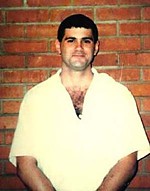Judge To Review Willingham Case
Baird sets hearing for Oct. 6-7
By Jordan Smith, Fri., Oct. 1, 2010

District Judge Charlie Baird will hold a two-day hearing in October to consider evidence on whether Cameron Todd Willingham was actually innocent of and executed for a crime that never occurred. Willingham was executed in 2004 in connection with a fire in his home in Corsicana that claimed the lives of his three young children. State officials – including the State Fire Marshal's Office – concluded that the 1991 fire had been deliberately set by Willingham; Willingham maintained his innocence, including in his last words before death.
Lawyers for Willingham's mother, Eugenia, and other surviving relatives filed a petition with Baird on Sept. 24, requesting the court to declare that Willingham had been wrongfully convicted and executed. The family's lawyers – including Gerald Goldstein from San Antonio, former Gov. Mark White, and Barry Scheck of the New York-based Innocence Project – are also asking that Baird open a court of inquiry to investigate whether various state officials might have engaged in official oppression by intentionally ignoring credible evidence that the fatal fire had not been deliberately set. The lawyers argue that the Willingham case highlights the serious inadequacies in the state's clemency and appeals process – the fail-safe procedures that are supposed to keep the innocent from execution – and that both the Board of Pardons and Paroles and Gov. Rick Perry ignored credible evidence that the fire was not arson, allowing the execution to go forward.
That assertion centers on the 2004 affidavit of local fire expert Dr. Gerald Hurst, who challenged the accuracy of the determination made by the fire marshal: "On first reading, a contemporary fire origin and cause analyst might well wonder how anyone could make so many critical errors in interpreting the evidence," Hurst wrote that February. The report on the Willingham fire prepared by the state "reflects the shortcomings in the state of the art" of fire investigation, he concluded. In the end, Hurst completely debunked the conclusions reached by the Fire Marshal's Office, writing that it had relied on outdated science. That information was given to the BPP and Perry shortly before Willingham's execution, but neither moved to delay the killing to seriously consider the new evidence, according to this most recent court filing. "Instead, it appears that the Governor's Office simply ignored it and allowed Mr. Willingham to be executed less than 90 minutes after receiving powerful evidence that his conviction was based on discredited science," the petition reads.
In all, nine fire science experts have now weighed in on the Willingham case and all agree that the state's investigation and analysis were seriously flawed, according to the court filing. That includes the opinion of expert Craig Beyler, whom the Forensic Science Commission hired last year to review the case. Days before Beyler was set to testify about those findings, Perry removed several commissioners, including the chair, attorney Samuel Bassett, and installed political ally John Bradley, the Williamson County district attorney, as the group's leader. Bradley has since tried to have the Willingham case closed without finding that the fire investigators had erred and without insisting that those officials had a duty to alert the criminal justice community that the science of investigating arson had changed, which might call into question their conclusions in any number of other cases. Amazingly, in a letter to the commission in August, Fire Marshal Paul Maldonado wrote that his office still stands by its conclusions in the Willingham case. The Forensic Science Commission has since declined to approve Bradley's draft report on the case and will instead be questioning fire experts about their conclusions at a future meeting.
Baird, who will retire at the end of the year, will consider testimony and evidence in the case on Oct. 6 and 7. Baird last year presided over the state's first posthumous hearing in the case of Tim Cole.
Got something to say on the subject? Send a letter to the editor.










